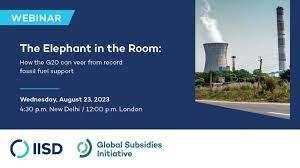In 2009, G20 governments committed to phasing out and rationalizing inefficient fossil fuel subsidies in the medium term, but 14 years later, the countries spent a record amount of public money to support coal, oil, and gas. What’s more, the issue of fossil fuel subsidies is notoriously absent in this year’s G20 agenda ahead of the Delhi Summit in September. With extreme weather events increasingly ravaging the globe, there is an urgent need to reduce our reliance on fossil fuels by shifting public financial flows away from them to directly support people and speed up the clean energy transition instead.
This webinar will offer a first glimpse at the findings of a new study by the International Institute for Sustainable Development (IISD) and partners, examining the volume of public financial support for fossil fuels in the G20 last year. The event will provide insights into how G20 countries can honour their subsidy reform commitments, with speakers taking a close look at the trends, challenges, and opportunities associated with ending public support for fossil fuels.
Agenda
Welcome
Aarti Khosla, Founder and Director, Climate Trends
Fanning the Flames: Study overview
Tara Laan, Senior Associate, IISD
Panel Discussion
Diala Hawila, Programme Officer, International Renewable Energy Agency
Nate Vernon, Economist, International Monetary Fund
Livi Gerbase, Policy Advisor, Instituto de Estudos Socioeconômicos
Matthew Watkinson, Executive Director of Current Analysis and Economic Research, Environment and Climate Change Canada
Q&A
Closing Remarks
Shruti Sharma, Senior Policy Advisor, IISD











Add new comment